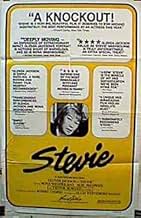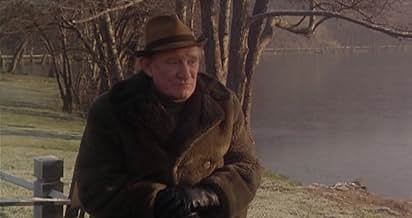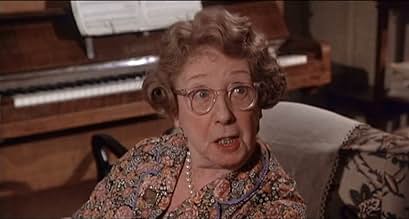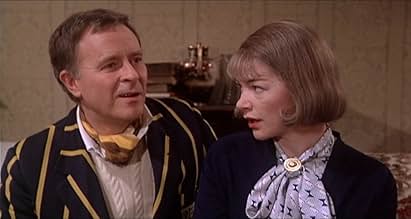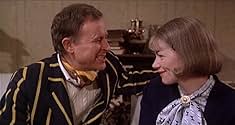This biographical film has Glenda Jackson portraying a British poet with emotional problems.This biographical film has Glenda Jackson portraying a British poet with emotional problems.This biographical film has Glenda Jackson portraying a British poet with emotional problems.
- Nominated for 1 BAFTA Award
- 8 wins & 4 nominations total
Featured reviews
Reading the reviews and feeling like I feel, I want to keep this film alive by adding a comment here.
I saw this years ago and never forgot it. I was (and am) a Glenda Jackson fan - although we are both of age now. The story of Stevie Smith was new to me at the time. What a wonderful way to get to know her writings ! It blew me way. I've read much of her since thanks to this film. I found it sublime. Much thanks to Mona Washburn and Trevor Howard (both died in 1988), but mostly to Glenda Jackson. I wish I could see it again. Can anybody show me where to get it ? Dl or otherwise. I'm grateful that I have the vinyl LP so I can listen to it from time to time :)
I saw this years ago and never forgot it. I was (and am) a Glenda Jackson fan - although we are both of age now. The story of Stevie Smith was new to me at the time. What a wonderful way to get to know her writings ! It blew me way. I've read much of her since thanks to this film. I found it sublime. Much thanks to Mona Washburn and Trevor Howard (both died in 1988), but mostly to Glenda Jackson. I wish I could see it again. Can anybody show me where to get it ? Dl or otherwise. I'm grateful that I have the vinyl LP so I can listen to it from time to time :)
There could never be a great film about Stevie Smith; the poet is simply too small, silly and self-absorbed, like her work - just the kind of poetry that seems to win awards, as hers did twice.
But smallness is the strength of this film, and its economy has been praised by many. Most of the action (mainly talk, in fact) takes place in one modest suburban front parlour, between Stevie and her deeply unpoetic Yorkshire aunt, played by Mona Washbourne, who comes a little too close to caricature, and does not quite measure up to Glenda Jackson, Trevor Howard or Alec McCowen, who comprise the rest of the minimal cast. Even at that, the two males are only allowed on-board as fringe-characters, McCowen as the hopeful young suitor Freddy, doomed to disappointment, and Howard as a mystery figure, known only as The Man, presumably an ex-lover, who recites a few of her poems with deep sincerity.
These poems display little virtue (rather like a poor man's Edith Sitwell), but they reveal an unusually deep preoccupation with death, alongside a confused and childish protest against middle-class values, as deeply embedded in the aunt's character. Her coining of the phrase 'Not waving but drowning' may yet survive as her epitaph.
Jackson carries full conviction as Stevie, having to act the same person from schooldays onwards, so we don't always know what age and stage we're at. She talks as though she's still in her teens when she visits Berlin with a German boyfriend at the beginning of the Nazi era, by which time Stevie would have been into her thirties.
Meanwhile she treats death as another character in the story, apparently welcoming the certainty of his arrival, and Howard reports that she died, unable to speak, but circling one word on a sheet of paper. The word was 'Death'.
But smallness is the strength of this film, and its economy has been praised by many. Most of the action (mainly talk, in fact) takes place in one modest suburban front parlour, between Stevie and her deeply unpoetic Yorkshire aunt, played by Mona Washbourne, who comes a little too close to caricature, and does not quite measure up to Glenda Jackson, Trevor Howard or Alec McCowen, who comprise the rest of the minimal cast. Even at that, the two males are only allowed on-board as fringe-characters, McCowen as the hopeful young suitor Freddy, doomed to disappointment, and Howard as a mystery figure, known only as The Man, presumably an ex-lover, who recites a few of her poems with deep sincerity.
These poems display little virtue (rather like a poor man's Edith Sitwell), but they reveal an unusually deep preoccupation with death, alongside a confused and childish protest against middle-class values, as deeply embedded in the aunt's character. Her coining of the phrase 'Not waving but drowning' may yet survive as her epitaph.
Jackson carries full conviction as Stevie, having to act the same person from schooldays onwards, so we don't always know what age and stage we're at. She talks as though she's still in her teens when she visits Berlin with a German boyfriend at the beginning of the Nazi era, by which time Stevie would have been into her thirties.
Meanwhile she treats death as another character in the story, apparently welcoming the certainty of his arrival, and Howard reports that she died, unable to speak, but circling one word on a sheet of paper. The word was 'Death'.
I was most fortunate to have seen the original London production of Stevie, which was a landmark experience for me: my first London play, my introduction to the highly individual poetry of Stevie Smith and my one chance to see Glenda Jackson live. As for the film, I cherish my copy of it. While I admit it isn't very cinematic, it is a delight for lovers of the language, as Jackson and Washburn banter, and watching Glenda Jackson work is a delight. Highly recommended.
For a thoughtful, literate, positive essay on the film, see Ed Hirsch in American Poetry Review (Jul/Aug 2000): 32-37: ""It's deeply fitting that the last words of the film are the words of Stevie's final poem ["Come Death (a)," read by Trevor Howard]. They fill the mind, the theater, with their faithful summons, their fatal timely music.""
Anyone interested in Stevie Smith, or with a taste for literary films, can't fail to appreciate the beauty of this little movie.The atmosphere created by the film is intimate & bookish, and Jackson's well-honed performance (she created the role in the stage play) conveys Stevie's vulnerability & brilliance wonderfully.
Did you know
- TriviaThe film was given a very limited release in the USA in late 1978, but only on the West Coast. Over two years later, it was shown theatrically on the East Coast and proved a big hit with critics, going on to win many awards, including 2 acting awards from the New York Film Critics.
- Quotes
Stevie Smith: Agatha Christie is so deadly serious in English... but in French, she's so delightfully funny! Je m'apelle Hercule Poirot, un detective. Her murders are so polite!
Details
- Runtime1 hour 42 minutes
- Sound mix
- Aspect ratio
- 1.78 : 1
Contribute to this page
Suggest an edit or add missing content


